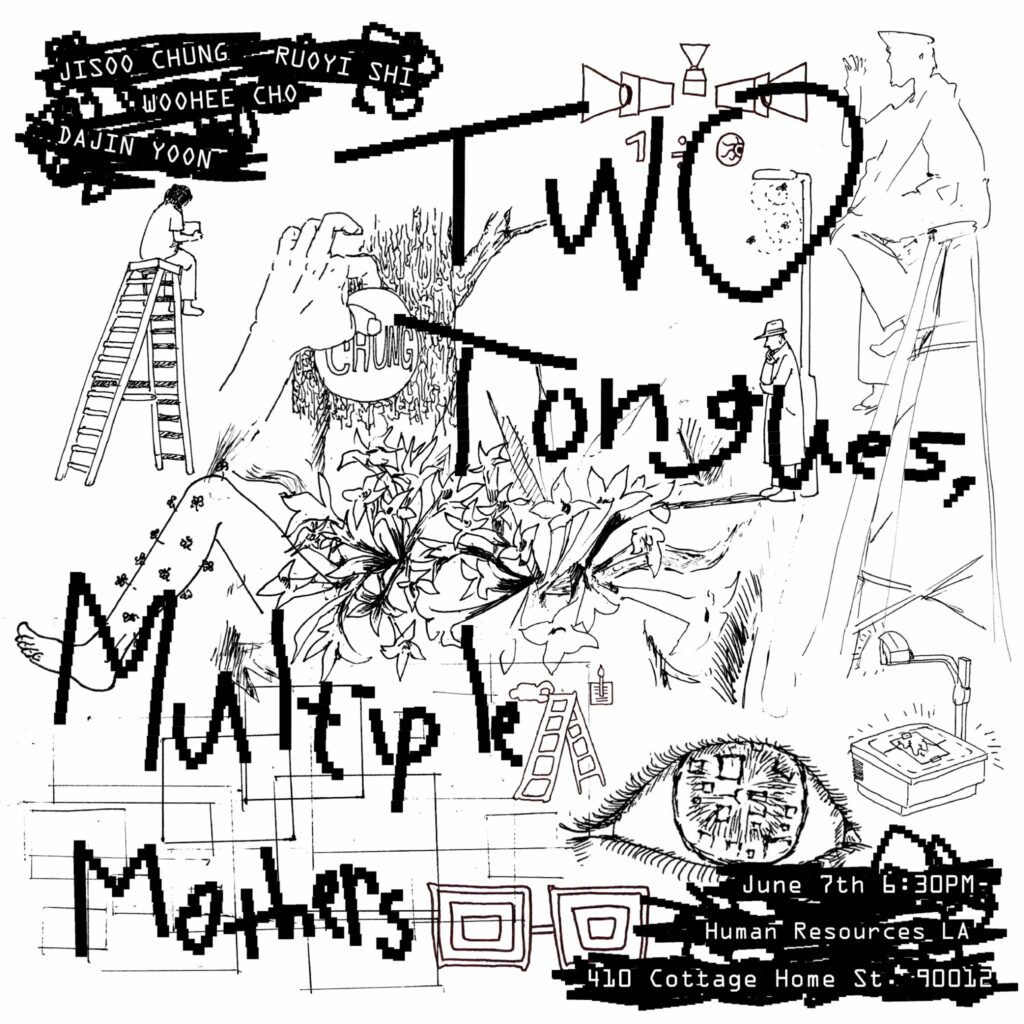
- This event has passed.
Two Tongues, Multiple Mothers
June 7, 2024 6:30 pm – 9:00 pm

Two Tongues, Multiple Mothers is a one night event consisting of screenings, performances, and objects that explore the space between languages as liminal bodies. The process of translation and interpretation is not widely known, and the delicate existence of these bodies is rather mysterious and misunderstood. Through personal, historical, and fictional narratives, Jisoo Chung, Dajin Yoon, Ruoyi Shi, and Woohee Cho investigate multiplicity in this transitional space.
*
Jisoo Chung’s Miss Kim Lilac is a story about a lilac tree called ‘Miss Kim’ that was brought to America from its native Korea and named by an American botanist. The tree’s name, which has changed over time as it moved across countries, is an imprint of colonial history, capitalization of nature, and the migration of Korean women. In the twenty-minute experimental documentary film, Miss Kim Lilac(2023), Chung’s journey to New Hampshire where she finds the early Miss Kim lilac specimens intersects with the narrative of its history that unfolds through the lilac’s perspective. If the name is the most fundamental linguistic framework to recognize oneself, will Miss Kim be able to find herself lost inside her multiple names?
Dajin Yoon’s First Person Perspective is a text-based performance that starts with the character called One who wakes up to find out that the world it lives in has changed significantly. The reactions from peers confuses One. Amongst the discrepancies in opinions, the familiarity of the shared language defamiliarizes, impairing One’s understanding of the worldly order. Then emerges the tenuous nature of perceptions where the individuals rely on their intuition for translation, filling in the gaps of the context and new meaning.
Ruoyi Shi’s (un)readable? (um)readable playfully blurs between readable and unreadable, speakable and unspeakable through drawings and sculptural objects. When a computer program cannot recognize foreign characters, it often uses hollow square shapes as the placeholder. These squares, sharing the same shape as the Chinese word (Kou),” meaning “mouth” in English, serve as a visual representation. However, devoid of meaning and sound, they remain silent, unable to convey any message. Originating from Pictograms, Chinese characters are simplified depictions of tangible objects. They evolved from literal representations to encompass symbolic and metaphoric meanings. The character “Kou” not only signifies actions involving the mouth but also serves as a fundamental element in the structure of other characters. I modified the text from the chosen paragraph, keeping only the square shapes. These squares will be used to form content that is both readable and unreadable, speakable and unspeakable to all of us.
Woohee Cho’s Letters Ladders is a performance, where he climbs up and down between two ladders while writing fragments of his journal regarding his recent loss on the wall. It deals with questions about queer diaries, family trauma, diaspora, and (mis)translation. When you lose words to describe your emotions, which languages are you drawn to grapple with? When language slips through the net, can we still exchange something through art?
*
Jisoo Chung is an interdisciplinary artist who works between Los Angeles and Seoul. Primarily through video and installation, she focuses on sociocultural constructs within quotidian objects and technology to explore language and the loss of one’s agency. Nonsense, mistranslations, personifying objects, and non-human perspectives are used in her works to re-navigate the idea of the self.
Dajin Yoon is an artist based in Los Angeles working in performance, drawing, and installation. Her practice examines the limits of language and its ability to shape, activate, and obfuscate beliefs and perceptions within shared experiences and anecdotal narratives.
Ruoyi Shi is an interdisciplinary artist based in Los Angeles. Inspired by ancient tales and rituals intertwined with language, habits, and societal norms, she combines humor and fiction to construct her poetic narratives. Her work explores the interface between nature and artificial existences, as well as the notion of truth and its fabrication.
Woohee Cho is a visual artist based in Los Angeles and Seoul. He received an MFA from California Institute of the Arts (2020) and a BFA from Seoul National University (2014). His works focus on moments in everyday life where individual identity collides with or is subsumed by society. These are transformed into installations, videos, and performances as a means of queering the normativity of society. Gathering, personalizing, and laughing are the primary methodologies of his practice. His work has been shown at Post Territory Ujeongguk, Los Angeles Municipal Art Gallery, Roy Edna Disney CalArts Theater, Ann Arbor Film Festival, and Cork International Film Festival, among others.